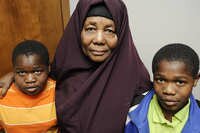Bantu families adapting to U.S.
 Bartamaha (Nairobi):- Hawa Khamis motions to her throat and says through an interpreter that hunger was a constant problem at the refugee camp in Kenya.
Bartamaha (Nairobi):- Hawa Khamis motions to her throat and says through an interpreter that hunger was a constant problem at the refugee camp in Kenya.
It’s where her son still lives, which is why Khamis, 69, is the legal guardian of her grandsons, Ibrahim Mohamed, 14, and Hassam Mohamed, 12. The boys’ mother died in Africa. Their father, her son, has been in the refugee camp for 15 years.
“If you can bring him here, that would be great,” she said through an interpreter.
Khamis and her grandsons joined the Somali Bantu Youth Association of Maine to give her guidance adapting to a new culture, and help keep her grandsons on the straight and narrow. The boys help around the house, she said. They do some cooking, dishes and cleaning.
Khamis was born in Somalia and fled to Kenya because of war. She and some of her family went to Atlanta, Ga., then came to Lewiston in 2006.
Life at the camp was bad, she said.
“You never know if you’re going to get something to eat tomorrow,” said Jama Warsame, a youth association leader.
Khamis can’t read or write. In Somalia, she farmed. She wants more for her grandsons.
“I want them to get an education, to work,” she said. “With the help of God, I want them to be a doctor or teacher.”
Mother of five
Ambiya Bule, 34, is another parent involved in the Bantu Youth Association. She has five children, ages 1 to 14. She was born in Somalia, lived in a Kenyan refugee camp for 13 years, moved to Colorado in 2004, and to Lewiston in 2009.
She smiles broadly when she says she recently became a U.S. citizen.
Bule joined the association so her children could play soccer and keep out of trouble, and she could get help parenting in a new land.
“Here, there is no parenting for us,” she said through an interpreter.
Warsame explained that parents have lost the disciplinary ways they knew in Africa.
“It’s different here,” he said. “Back home if they do something bad, we can use the cane or stick. But here, the only punishment we can do is talk to them.”
The look on Bule’s face indicated that talking doesn’t always work.
Through the association, parents are learning to set household rules and take away privileges, Warsame said. When his daughter misbehaves, he tells her she can’t watch television. But the concept of grounding is new; it didn’t exist in their old world.
Understanding the culture here is one of the biggest challenges for Somali Bantu families, Rilwan Osman said. Their children are adapting to American ways faster than their parents. Sometimes that’s good; other times, it’s not.
“The child has one culture; the parent has another,” Osman said. “They both come to the same house. It’s like having two cultures in one house.”
Bule wants her children to be educated so they can read and write, “maybe become a professional soccer player, a doctor, and be active in the community.”
She doesn’t want her children involved in juvenile crime.
“I don’t want my kids to be part of that,” she said. “I want them to learn.”
Youth leader
Warsame, 26, and his wife have five children, ages 2 months to 6 years. He works second shift.
He left Somalia in 1992 because of the war. He doesn’t remember a lot about Somalia, but he remembers the refugee camp in Kenya, where he lived for 12 years and got some schooling.
For refugees who don’t have anyone sending them money, “life is very hard,” he said. “You worry about food, violence. It’s close to the border in Somalia. People come attack you because it’s close. Every single day people get attacked. There’s no police you can call.”
Children in families with money can get schooling; those without money do not, he said.
He’s glad that now he doesn’t have to worry about his children going to school.
“They have more than what I had,” he said. He hopes his oldest will be ready to graduate from high school 10 years from now. He speaks English well, but says his oldest daughter’s English is better than his.
He volunteered to be a soccer coach, youth leader and translator to help others.
“The language barrier keeps the parents down,” Warsame said. “That’s why we created the program for parents, to help explain what’s going on.”
========================
Source:- Sunjournal.
Comments
comments
 Calendar
Calendar




































